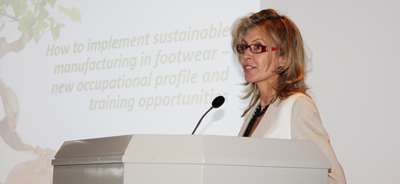The conference to present the results of “Step 2 Sustainability” project, took place during the last edition of GDS Düsseldorf. A discussion panel with key players in the field, illustrated the “Best Cases” for the environmental conservation and the social responsibility for the footwear industry
The workshop was organized by the European Confederation of the Footwear Industry (CEC) and by the “Step 2 Sustainability” project partners, including ARSUTORIA school, CTCP (Portugal), INESCOP (Spain), IRCUO (Slovenia), ISC (Germany), Gheorge Asachi Technological University of Iasi – Romania, the Czech Footwear and Leather Association ( OKA) and the Portuguese footwear company Klaveness. There were several and various interesting subjects discussed, as the insights on sustainable manufacturing, the training opportunities and the new professional roles on enterprises, ad hoc e-learning training and the retailers’ point of view. In particular, the topical CO2Shoe project from INESCOP, the Spanish Footwear Technological Institute, presented by Carmen Arias Castellano, CEC president, and partner of the initiative.
The project scope is to develop a calculation method of the carbon footprint in the footwear industry, to allow a measurement of the greenhouse gas emissions (GHG) produced by the manufacturing of each single pair of shoes. At the moment there is a vast spectrum of methods used for the carbon footprint calculation, given the big differences in the results obtained. To address this situation, CO2Shoe project was launched to establish uniform criteria for the greenhouse gas calculation during the manufacturing process and the subsequent footwear lifecycle including its disposal. The project involves four countries from the European Union: Spain, Italy, Portugal and Poland; it will be extended to the rest of the European area.
The purpose at the end of the project is to provide footwear companies a unique and efficient system, that consents them to identify the critical issues for the reduction of greenhouse gas emissions, in order to implement an ecological design of the production models as a way to improve the products’ quality from an environmental perspective since the initial stages. For further information: www.step2sustainability.eu





